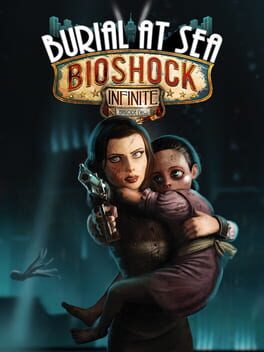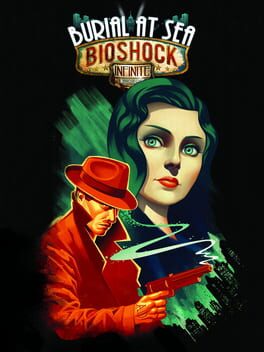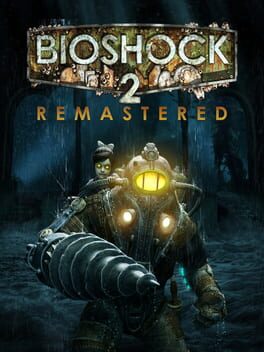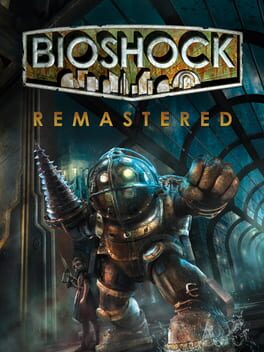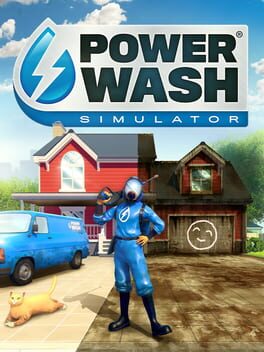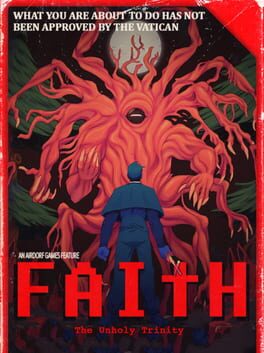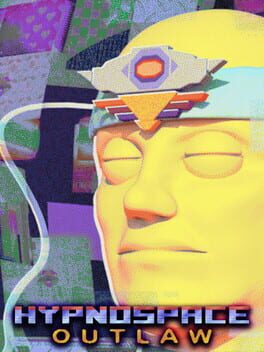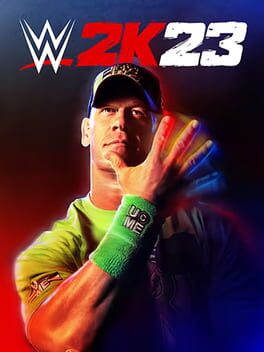WilliamWhy
This review contains spoilers
Competes with the original two games as the high water-mark of the series and, appropriately, stumbles in most of the expected ways.
As usual, the presentation is fabulous, especially for DLC content. The mixture of old and new Rapture, as well as a trip back to Columbia, looks as good as ever and still manages some jaw-dropping backdrops and scenes.
Of all the games in the series, this one is the most fun to play because it softly dispenses with the run-and-gun stylings of every entry before it and lets the player choose between that and a much more interesting stealth approach. Now, as with its predecessor game, the stealth mechanics here would be improved upon wildly in ensuing years (hello, Dishonored), but it's a fine attempt at shaking up gameplay in a way that makes sense and, for me, led to much more satisfying and engaging gameplay than practically any other installment. This time, I stuck to using stealth, which meant relying more on plasmids, vending machines, and running and hiding rather than straight fighting. Everything worked well enough in concert that I had a consistent good time throughout.
I'm sure I felt differently a decade ago when first playing Infinite but, coming back to the whole series again, I really don't care for the first BioShock and Infinite running together, story-wise. The first game is a lovely stand-alone piece, artistically, and despite a worthy sequel, never really needed revisiting; in fact, from Infinite onwards, I find the references and inclusion of elements from the first game to feel increasingly cheap. Yes, I also love the setting of Rapture and I remember a lot of moments from the first game, but I would really like it to stand farther apart from the game that I didn't like all that much.
As with Infinite and BaS Ep 1 before it, Ep 2 loves to dally into the causality and alternate realities and it's the kind of story that is best not thought about too hard, lest one pull on a thread too hard and ruin it. Elizabeth proves to be a much more engaging player character than Booker, both mechanically and personality-wise, but the story itself left me a bit cold, especially given that it all comes back to the first game (don't we love it, folks?) and Elizabeth's place in it involves a fair amount of hand-waving and retconning for a story that was fine left alone. Again, I wish the first BioShock could have stood on its own as a story, instead of being propped up and even caused by the worst game in its franchise.
A very good piece of DLC and perhaps the most consistent BioShock experience in the catalogue but not without all the old ghosts that the series never shrugged off.
As usual, the presentation is fabulous, especially for DLC content. The mixture of old and new Rapture, as well as a trip back to Columbia, looks as good as ever and still manages some jaw-dropping backdrops and scenes.
Of all the games in the series, this one is the most fun to play because it softly dispenses with the run-and-gun stylings of every entry before it and lets the player choose between that and a much more interesting stealth approach. Now, as with its predecessor game, the stealth mechanics here would be improved upon wildly in ensuing years (hello, Dishonored), but it's a fine attempt at shaking up gameplay in a way that makes sense and, for me, led to much more satisfying and engaging gameplay than practically any other installment. This time, I stuck to using stealth, which meant relying more on plasmids, vending machines, and running and hiding rather than straight fighting. Everything worked well enough in concert that I had a consistent good time throughout.
I'm sure I felt differently a decade ago when first playing Infinite but, coming back to the whole series again, I really don't care for the first BioShock and Infinite running together, story-wise. The first game is a lovely stand-alone piece, artistically, and despite a worthy sequel, never really needed revisiting; in fact, from Infinite onwards, I find the references and inclusion of elements from the first game to feel increasingly cheap. Yes, I also love the setting of Rapture and I remember a lot of moments from the first game, but I would really like it to stand farther apart from the game that I didn't like all that much.
As with Infinite and BaS Ep 1 before it, Ep 2 loves to dally into the causality and alternate realities and it's the kind of story that is best not thought about too hard, lest one pull on a thread too hard and ruin it. Elizabeth proves to be a much more engaging player character than Booker, both mechanically and personality-wise, but the story itself left me a bit cold, especially given that it all comes back to the first game (don't we love it, folks?) and Elizabeth's place in it involves a fair amount of hand-waving and retconning for a story that was fine left alone. Again, I wish the first BioShock could have stood on its own as a story, instead of being propped up and even caused by the worst game in its franchise.
A very good piece of DLC and perhaps the most consistent BioShock experience in the catalogue but not without all the old ghosts that the series never shrugged off.
A decent little set-up to a stronger second part. The novelty of seeing Rapture at the height of its powers is one that the developers and artists totally run with, eagerly creating its splendor and sheer wealth in a way that really means a lot to people who have experienced the earlier games.
I also noticed a few gameplay tweaks between Infinite and this that helped to bring it back to its roots in ways that made sense (ie. allowing multiple guns). It's a step up from its predecessor but is very short and ultimately more of the same with minor improvements, a necessary first step en route to something greater.
I also noticed a few gameplay tweaks between Infinite and this that helped to bring it back to its roots in ways that made sense (ie. allowing multiple guns). It's a step up from its predecessor but is very short and ultimately more of the same with minor improvements, a necessary first step en route to something greater.
2013
The best time to play this is the first time. After that, and especially in the ensuing 10 years, the seams (tears?) are much more noticeable.
As with the previous two games, this game is best realized as a roller coaster ride. The decent shooting and mechanics are buoyed by incredible artistic and environmental design. A decade later, this game still has moments of awe in the way it looks and the scenes it constructs and paints, even down to small, seemingly insignificant details in the world. It's clear that the visual artists working on this game really cared about making the world feel real and their effort did not go to waste.
Wish one could say the same for practically everything else. As said before, the gameplay rarely rises above decent, and I found it often monotonous. In trying to be a roller coaster ride, an experience for seemingly everyone, the game splits the difference with several one-note or superfluous mechanics (ie. morality, elements of choice, stealth, the numbers flying off an enemy when you shoot them) that don't add much. There's also re-imaginings of elements or mechanics that worked fine-to-well in the previous games and that are overhauled to worse effect, such as the 2-gun limit instead of the 2-plasmid limit or the worsening of Vigors (Devil's Trap sucks ass compared to Incinerate). I found it funny that the game had to constantly remind me to use Vigors, because a lot of them aren't all that fun or useful.
This version (the one you can get in modern storefronts) has glaring technical issues that I can't believe weren't fixed from the original version. The subtitle size is pathetically small and cannot be altered and audio logs don't have subtitles at all, a feature that the previous two games already had! What's more, the in-game character dialogue, enemy voice lines, sound effects, and non-diegetic dialogue like the audio logs constantly run into each other, which can create moments of cacophonous, confusing noise. More ways that modern games have improved over the presentation and accessibility of ones that aren't even that old.
The story...oof. A product of its time (derogatory), in that it puts forth a story where both sides in a conflict that involves racism and slavery are Both A Little Bit Wrong, which was not good but "excusable" then and is just laughable now. Add to that the paternalistic streak of games of this part of the decade, as well as a sci-fi turn that doesn't particularly care to explain itself, and you have a through-line that is as uncompelling as its gameplay. Even the in-game elements lack in charm and, before long, the game's appeal was as little more than a collect-a-thon for me.
Upon its release, BioShock Infinite was showered with praise, and was famously the game that Roger Ebert supposedly would have held up as art on par with his precious films. I certainly don't begrudge anyone for being blown away by this back in the day; certainly, I was one of them. Coming back to it, though, the industry has since lapped it considerably and it feels somehow more of a relic of its time than the previous two entries in the series. I found it a bit dull to play through all the way again, which contrasts the pretty good time I had with its two predecessors, and I don't think I'd care to play it again. There are many better games that have come out since its release that have done everything it does but better (ie. Prey 2017, Dishonored) that I'd much rather play those again and leave this in the past.
As with the previous two games, this game is best realized as a roller coaster ride. The decent shooting and mechanics are buoyed by incredible artistic and environmental design. A decade later, this game still has moments of awe in the way it looks and the scenes it constructs and paints, even down to small, seemingly insignificant details in the world. It's clear that the visual artists working on this game really cared about making the world feel real and their effort did not go to waste.
Wish one could say the same for practically everything else. As said before, the gameplay rarely rises above decent, and I found it often monotonous. In trying to be a roller coaster ride, an experience for seemingly everyone, the game splits the difference with several one-note or superfluous mechanics (ie. morality, elements of choice, stealth, the numbers flying off an enemy when you shoot them) that don't add much. There's also re-imaginings of elements or mechanics that worked fine-to-well in the previous games and that are overhauled to worse effect, such as the 2-gun limit instead of the 2-plasmid limit or the worsening of Vigors (Devil's Trap sucks ass compared to Incinerate). I found it funny that the game had to constantly remind me to use Vigors, because a lot of them aren't all that fun or useful.
This version (the one you can get in modern storefronts) has glaring technical issues that I can't believe weren't fixed from the original version. The subtitle size is pathetically small and cannot be altered and audio logs don't have subtitles at all, a feature that the previous two games already had! What's more, the in-game character dialogue, enemy voice lines, sound effects, and non-diegetic dialogue like the audio logs constantly run into each other, which can create moments of cacophonous, confusing noise. More ways that modern games have improved over the presentation and accessibility of ones that aren't even that old.
The story...oof. A product of its time (derogatory), in that it puts forth a story where both sides in a conflict that involves racism and slavery are Both A Little Bit Wrong, which was not good but "excusable" then and is just laughable now. Add to that the paternalistic streak of games of this part of the decade, as well as a sci-fi turn that doesn't particularly care to explain itself, and you have a through-line that is as uncompelling as its gameplay. Even the in-game elements lack in charm and, before long, the game's appeal was as little more than a collect-a-thon for me.
Upon its release, BioShock Infinite was showered with praise, and was famously the game that Roger Ebert supposedly would have held up as art on par with his precious films. I certainly don't begrudge anyone for being blown away by this back in the day; certainly, I was one of them. Coming back to it, though, the industry has since lapped it considerably and it feels somehow more of a relic of its time than the previous two entries in the series. I found it a bit dull to play through all the way again, which contrasts the pretty good time I had with its two predecessors, and I don't think I'd care to play it again. There are many better games that have come out since its release that have done everything it does but better (ie. Prey 2017, Dishonored) that I'd much rather play those again and leave this in the past.
When this was first released, I was scared off from ever trying it because it was, seemingly inarguably, worse in every way than the first one. Having a chance to play through it myself, it is certainly the first game and not much else.
I mean, look, there are worse foundations to build off from than the initial BioShock and this does a pretty good job, especially in the writing and story-building. It doesn't feel like a re-hash of the first game in that sense; instead, it builds out the environment of Rapture in ways that feel natural and interesting, giving the location a bit more depth and further fleshing out both old and new characters.
The sequel feels less driven by story and "on-rails" as the first game is, which is fine but also makes it feel like it has less of an aura .Aside from the novelty of being a Big Daddy this time around, the gameplay is pretty much the same, which is ultimately a push. Some tweaks in the guns and systems are welcome and the loop of adopting Little Sisters and protecting them is better than it has any right to be. Regardless, the endless shooting and collection gets repetitive when you don't have as strong of narrative hooks to see you through.
This is definitely no stinker and it's a fine follow-up for anyone who simply couldn't get enough of what BioShock was doing. I'm glad I finally played it and enjoyed my time enough but I don't think I'll be returning to it.
I mean, look, there are worse foundations to build off from than the initial BioShock and this does a pretty good job, especially in the writing and story-building. It doesn't feel like a re-hash of the first game in that sense; instead, it builds out the environment of Rapture in ways that feel natural and interesting, giving the location a bit more depth and further fleshing out both old and new characters.
The sequel feels less driven by story and "on-rails" as the first game is, which is fine but also makes it feel like it has less of an aura .Aside from the novelty of being a Big Daddy this time around, the gameplay is pretty much the same, which is ultimately a push. Some tweaks in the guns and systems are welcome and the loop of adopting Little Sisters and protecting them is better than it has any right to be. Regardless, the endless shooting and collection gets repetitive when you don't have as strong of narrative hooks to see you through.
This is definitely no stinker and it's a fine follow-up for anyone who simply couldn't get enough of what BioShock was doing. I'm glad I finally played it and enjoyed my time enough but I don't think I'll be returning to it.
2016
I had a real itch to replay Bioshock and it was definitely scratched, but I'm not sure I'll have that desire again.
The strongest aspects of the game are the dialogue and (some of) the writing, as well as the mechanics of how gameplay works. The core plot is a strong invitation into a world that feels well-realized and there is no end to the iconic lines spoken by the memorable characters. Playing it this time around felt like a really good roller coaster, in that it's not a completely interactive experience but it still does what it can to immerse you in the story it's trying to tell.
Forgiving it the necessary marks of aging, everything still plays out fairly well from end-to-end. The shooting and plasmids feel pretty good and the environments do enough to spice up the gameplay loop, for the most part. After a while, though, the shallow nature of the run-and-gun gameplay wears a bit thin and the shortcomings of this lauded game become more apparent.
Bioshock, I think, has always been a game considered as having a strong opening and a weak ending. That's certainly what I think and what I've heard others describe the game as, but you can really track the rate at which the game itself begins to go downhill. Sure, the gameplay is fun, but only for a little while; in fact, before too long, it begins to become quite rote. Nearly 2 decades later, enough games have improved on the template set out by Bioshock that the original feels like a relic in comparison to them and, unfortunately, doesn't hold the same sway over me when I'm double the age I was when I first played it. The moderate frustration of the remaster freezing on me thrice, losing me hours of game time, is also a bummer.
An important game, no doubt, but one that can't help but wear the ravages of time on its sleeve, much like the creaking halls of Rapture itself.
The strongest aspects of the game are the dialogue and (some of) the writing, as well as the mechanics of how gameplay works. The core plot is a strong invitation into a world that feels well-realized and there is no end to the iconic lines spoken by the memorable characters. Playing it this time around felt like a really good roller coaster, in that it's not a completely interactive experience but it still does what it can to immerse you in the story it's trying to tell.
Forgiving it the necessary marks of aging, everything still plays out fairly well from end-to-end. The shooting and plasmids feel pretty good and the environments do enough to spice up the gameplay loop, for the most part. After a while, though, the shallow nature of the run-and-gun gameplay wears a bit thin and the shortcomings of this lauded game become more apparent.
Bioshock, I think, has always been a game considered as having a strong opening and a weak ending. That's certainly what I think and what I've heard others describe the game as, but you can really track the rate at which the game itself begins to go downhill. Sure, the gameplay is fun, but only for a little while; in fact, before too long, it begins to become quite rote. Nearly 2 decades later, enough games have improved on the template set out by Bioshock that the original feels like a relic in comparison to them and, unfortunately, doesn't hold the same sway over me when I'm double the age I was when I first played it. The moderate frustration of the remaster freezing on me thrice, losing me hours of game time, is also a bummer.
An important game, no doubt, but one that can't help but wear the ravages of time on its sleeve, much like the creaking halls of Rapture itself.
2019
I'm not the same person I was when I started this game.
I consider myself agnostic to Hideo Kojima's reputation in the industry; I think he's a singular voice among his peers and in video game history but I also am not overly enamored with the choices he makes in his games. There was a time where the cult of personality around him annoyed me, and because of that, it took me years before deciding to give Death Stranding a fair shake. The game's facile elements struck me as deeply silly and unserious when I encountered them and I dismissed it as masturbatory Kojima shit.
I never could have guessed that it'd be one of my favorite gaming experiences of the 2020s, and probably my life.
What I discovered about myself in playing through this is that I adore games that allow you to do work that we consider menial and laborious in real life. Through games, I can bypass the limits of my body and my patience, allowing me to have inhuman levels of stamina and perseverance. The experience of delivery in Death Stranding was intoxicating, both as an idea and in practice with the game's systems. Yes, there were so many frustrating and dismaying journeys throughout, but it made the successful runs and innovations in expediency sing out all the sweeter. I'm not sure I've had more fun in a game than throwing on a podcast or YouTube video and saddling up for a delivery run or, in what I will remember as the most singularly satisfying experience in the game, building a highway across America.
I will also say that, although Kojima's ideas are often laughable when you hear them the first time, there is enough of a grounding in tangible ideas that allow them to have some kind of a rooting in logic or understanding, if you're willing to go along with it. I'm not sure I could accurately summarize everything that happens in the game or why, not to mention the various concepts in play, but I think I could if I really wanted to completely understand it. There are compelling and imaginative ideas at work and a lot of it feels like it was appropriately realized, which I really appreciate.
Although the experience of it was thoroughly a positive one for me, I still got caught on all the ways in which Hideo Kojima games usually snag me. There are the expected lengthy cutscenes with little warning as to when they are coming in your experience, which become especially egregious by the end. As a storyteller, Kojima has always had difficulty in structuring his games in a way that makes cohesive sense when experiencing them. Although his reputation is as someone whose themes and imagery are inscrutable or weird-for-weird-sake, he also cannot resist laying out for you exactly what everything means, whether through crushingly long monologues or extensive written material. Combined with the considerable length of the overall game and the seemingly-intentional muted acting from the main characters, it made it hard for me to buy into a lot of the interpersonal relationships on an emotional level. The theme of connection really hit with me through the game's systems but the narrative lacked the ability to tie it all together into one big hit.
I also felt that the game's systems of combat seemed to be at odds with that theming. Oftentimes, the "worst" parts of the game were the ones that made gunplay and outright aggression the only course of action, both because I found those parts largely tedious and because they seemed to be counter to the rest of the systems of play the game encouraged you to take (ie. non-violence, stealth, logistics).
Death Stranding is deeply imperfect but its successes hit far too hard for me to feel all that negatively against it. Quite the contrary, actually, because I think that this may be my personal favorite of Kojima's games that I've played. I still adore Metal Gear Solid 3 but it is a very old game at this point, and Death Stranding's story definitely felt more fully realized than that of Metal Gear Solid V, which featured terrific gameplay. This game is proof of why I feel it's important to always interrogate your own reactions to things and never take your first impression for granted. If I had continued to dismiss this as I had initially in 2019, I would have missed out on an incredibly enjoyable time spent delivering packages and bringing the world a little closer together.
I consider myself agnostic to Hideo Kojima's reputation in the industry; I think he's a singular voice among his peers and in video game history but I also am not overly enamored with the choices he makes in his games. There was a time where the cult of personality around him annoyed me, and because of that, it took me years before deciding to give Death Stranding a fair shake. The game's facile elements struck me as deeply silly and unserious when I encountered them and I dismissed it as masturbatory Kojima shit.
I never could have guessed that it'd be one of my favorite gaming experiences of the 2020s, and probably my life.
What I discovered about myself in playing through this is that I adore games that allow you to do work that we consider menial and laborious in real life. Through games, I can bypass the limits of my body and my patience, allowing me to have inhuman levels of stamina and perseverance. The experience of delivery in Death Stranding was intoxicating, both as an idea and in practice with the game's systems. Yes, there were so many frustrating and dismaying journeys throughout, but it made the successful runs and innovations in expediency sing out all the sweeter. I'm not sure I've had more fun in a game than throwing on a podcast or YouTube video and saddling up for a delivery run or, in what I will remember as the most singularly satisfying experience in the game, building a highway across America.
I will also say that, although Kojima's ideas are often laughable when you hear them the first time, there is enough of a grounding in tangible ideas that allow them to have some kind of a rooting in logic or understanding, if you're willing to go along with it. I'm not sure I could accurately summarize everything that happens in the game or why, not to mention the various concepts in play, but I think I could if I really wanted to completely understand it. There are compelling and imaginative ideas at work and a lot of it feels like it was appropriately realized, which I really appreciate.
Although the experience of it was thoroughly a positive one for me, I still got caught on all the ways in which Hideo Kojima games usually snag me. There are the expected lengthy cutscenes with little warning as to when they are coming in your experience, which become especially egregious by the end. As a storyteller, Kojima has always had difficulty in structuring his games in a way that makes cohesive sense when experiencing them. Although his reputation is as someone whose themes and imagery are inscrutable or weird-for-weird-sake, he also cannot resist laying out for you exactly what everything means, whether through crushingly long monologues or extensive written material. Combined with the considerable length of the overall game and the seemingly-intentional muted acting from the main characters, it made it hard for me to buy into a lot of the interpersonal relationships on an emotional level. The theme of connection really hit with me through the game's systems but the narrative lacked the ability to tie it all together into one big hit.
I also felt that the game's systems of combat seemed to be at odds with that theming. Oftentimes, the "worst" parts of the game were the ones that made gunplay and outright aggression the only course of action, both because I found those parts largely tedious and because they seemed to be counter to the rest of the systems of play the game encouraged you to take (ie. non-violence, stealth, logistics).
Death Stranding is deeply imperfect but its successes hit far too hard for me to feel all that negatively against it. Quite the contrary, actually, because I think that this may be my personal favorite of Kojima's games that I've played. I still adore Metal Gear Solid 3 but it is a very old game at this point, and Death Stranding's story definitely felt more fully realized than that of Metal Gear Solid V, which featured terrific gameplay. This game is proof of why I feel it's important to always interrogate your own reactions to things and never take your first impression for granted. If I had continued to dismiss this as I had initially in 2019, I would have missed out on an incredibly enjoyable time spent delivering packages and bringing the world a little closer together.
2022
Incredibly good at what it's going for, an S-tier "throw on a podcast and play" game. It's unbelievably satisfying to watch something get cleaner in real time and also is so effective at tricking you into thinking you're doing actual work. When I started playing, I snickered at there being paid DLC, and now that I'm finished, I'm thinking I'll buy it all next chance I get. If anything about this appeals to you, you have to check it out.
2022
A very strong throwback to a type of game I have a lot of time for. The puzzle design is some of the best I've ever seen, in terms of giving me a challenge while also being not-frustrating. The shooting mechanics got on my nerves more than they didn't, which I know is part of the package but did impact my enjoyment at times.
2015
2019
2023
The fun systems are largely the same, but this edition takes a half-step back from 2K22 in a couple of noticeable ways.
The roster is not as good as last year's, which is hardly the game's fault, but there's less fun to be had in playing around with all the available wrestlers when you're not exactly jazzed about half of them. The AI is fine but dumb in a couple of crucial places (ie. multi-man scenarios), and there's a couple of instances where certain special moves are nigh-impossible to pull off accurately (ie. Tyler Bate and Joe Gacy's signatures), which takes away from the fun here and there.
Slow-downs on PS4 are noticeable and frustrating, especially in multi-man matches. Game plays fine up to 6-man and then hits the brakes upward of that, which makes playing those modes just a tiny bit more frustrating.
As it's the main part of the game that I play, MyFaction this year feels like a bit of a sleepier rollout compared to last year. A distinct lack of Evolution cards and repetition of un-fun match types make the mode feel like a bit more of a drag. I wasn't as inspired to play through the single-player modes either, as they feel overly long and rely too heavily on the CAW suite, which I'm not interested in.
I still logged dozens and dozens of hours into this over the year, so I can't say I didn't get my money's worth, but I'm not nearly as into it as I was for 2K22.
The roster is not as good as last year's, which is hardly the game's fault, but there's less fun to be had in playing around with all the available wrestlers when you're not exactly jazzed about half of them. The AI is fine but dumb in a couple of crucial places (ie. multi-man scenarios), and there's a couple of instances where certain special moves are nigh-impossible to pull off accurately (ie. Tyler Bate and Joe Gacy's signatures), which takes away from the fun here and there.
Slow-downs on PS4 are noticeable and frustrating, especially in multi-man matches. Game plays fine up to 6-man and then hits the brakes upward of that, which makes playing those modes just a tiny bit more frustrating.
As it's the main part of the game that I play, MyFaction this year feels like a bit of a sleepier rollout compared to last year. A distinct lack of Evolution cards and repetition of un-fun match types make the mode feel like a bit more of a drag. I wasn't as inspired to play through the single-player modes either, as they feel overly long and rely too heavily on the CAW suite, which I'm not interested in.
I still logged dozens and dozens of hours into this over the year, so I can't say I didn't get my money's worth, but I'm not nearly as into it as I was for 2K22.
